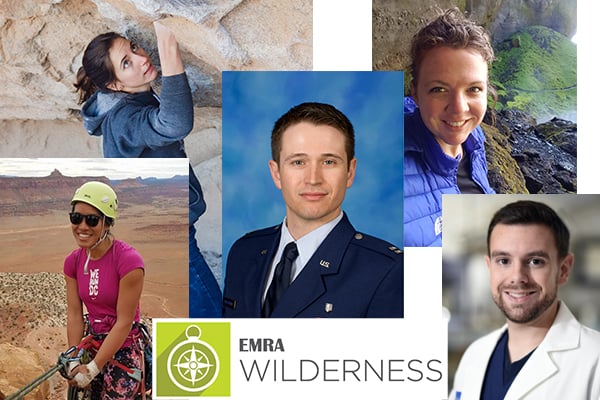“The Big What If”, Thinking Through the SOAP Scenario
Bianca Mayfield, MSIV - Burrell College of Osteopathic Medicine
EMRA MSC Southwest Regional Representative, 2021-2022
Match week is the culmination of years of hard work, and thus, is an exciting and daunting time. The hope is to match within the Main Residency Match, but as future EM physicians, we should be prepared for anything. The other option for students who remain unmatched or partially unmatched is to enter the Supplemental Offer and Acceptance Program (SOAP). For any student who participates in the SOAP process, EMRA has your back. EMRA has endorsed a guide to the nuts and bolts of SOAP here, but here in this article we detail the process, hear from others who have succeeded, and arm you with confidence going into Match Week.
Match Week for the Main Residency Match takes place the third week in March, spanning the time from Monday morning to Friday afternoon. The excitement begins on Monday at 9:00 AM ET, when applicants learn if, but not where, they matched for residency. If an applicant is unmatched following Monday's announcement, they can enter the Supplemental Offer and Acceptance Program (SOAP). This program allows partially and fully unmatched students the opportunity to interview for unfulfilled positions prior to Match Day. Not every program participates in the SOAP, but those who do will be listed in the Registration, Ranking, and Results (R3) system for eligible students to view.
In order to enter the SOAP process, students must meet the eligibility requirements. A student must: be registered for the main residency match, be able to enter graduate medical education by July 1st in the year of the match as verified by your medical school or Educational Commission For Foreign Medical Graduates (ECFMG), and be partially or fully unmatched on the Monday of Match week. Students apply to unfilled programs through ERAS, and are able to submit up to 45 applications total for all rounds of the SOAP. Students will only be able to see programs for which they are eligible. This means that individuals that are partially matched to an advanced program, can only apply to preliminary or transitional year programs. Similarly, individuals that partially matched into preliminary programs can only apply to advanced programs, and fully unmatched participants can apply to all program types. Programs will then review these in ERAS and individually reach out to applicants for interviews beginning on Monday afternoon. Keep in mind, all communication will be through ERAS as students are not permitted to contact programs outside of this process. From the interviews, programs create a preference list to be used during the SOAP process. Students are able to just focus on meeting the programs and need not make a rank list.
Now on to how the process works. The SOAP takes place on Wednesday and Thursday of match week, and consists of four rounds of two hours each. During this time, positions are offered to applicants based on a program's preference list and can be viewed in the R3 system (not ERAS). Each round, participating programs extend two offers from their list. Applicants may receive multiple offers and can choose to accept, decline, or let the offer expire in the two hours. Note, if an applicant declines or lets the offer expire, the offer will not be extended in future rounds. Accepting one of the offered positions automatically declines others and results in a binding commitment between the program and applicant.
Each year, the National Residency Match Program (NRMP) also releases match data on their website that includes information from the SOAP. There’s available data on the number of participating programs and positions filled for each specialty, the type of applicants accepting positions, as well as the data on offers extended. This is another helpful tool in making a game plan during the SOAP process.
Setting all of these facts aside, the real experience of the SOAP process can only be heard from those who have gone through it. A successful transitional intern who completed this process spoke to me about matching in the SOAP and advice they wish to pass along to the next generation of physicians.
One of the first things the intern suggests is finding a mentor to help with the application process and provide introductions to others in the field. Earlier in medical school, the intern wishes they had made more of these valuable connections. For emergency medicine, check out the EMRA Student-Resident Mentorship Program available to students at any level. They also note that schoolmates who went through the SOAP in earlier years were a wealth of information. They were in the same shoes at some point, and can hopefully provide guidance and emotional support.
As far as the SOAP process itself, they report that using ERAS to apply to programs was easy to complete. They do however, caution about the limited decision making time which can make students feel rushed. They recount this and other intense emotions of the time, but hope that students can focus on the few days of SOAP in order to match. They advise being strategic as there is a limit on the number of programs a student can apply to, and there may not be many options in the specialty they are seeking. Grab some help and research each potential program carefully, making sure that the program is truly available. Some may be civilian military positions or filled through other pathways and are not actually open at that time. Along these lines, they hope individuals in this situation will be receptive to other specialties. Applying to many specialties in the SOAP can help students find the perfect spot that they may not have considered previously.
The intern also offers advice for after the conclusion of match week. They report that many programs open up after match week and could have positions available. Students can keep an eye out for these programs and email them regarding the openings. The intern suggests also emailing programs of interest that they may apply to next year, after the conclusion of a transitional year for example. They forged connections by sharing with programs their desire to match into that specialty, and asking to keep them in mind for future positions.
Whether students match in the Main Residency Match or in the SOAP, each individual has so much to be proud of. Knowing how this process works and all of your options will hopefully ease any concerns you have this March.
References:
- National Resident Matching Program. (n.d.). SOAP. NRMP. Retrieved January 1, 2022, from https://www.nrmp.org/residency-applicants/soap/
- National Resident Matching Program, Results and Data: 2021 Main Residency Match®. National Resident Matching Program, Washington, DC. 2021.
Related Content






